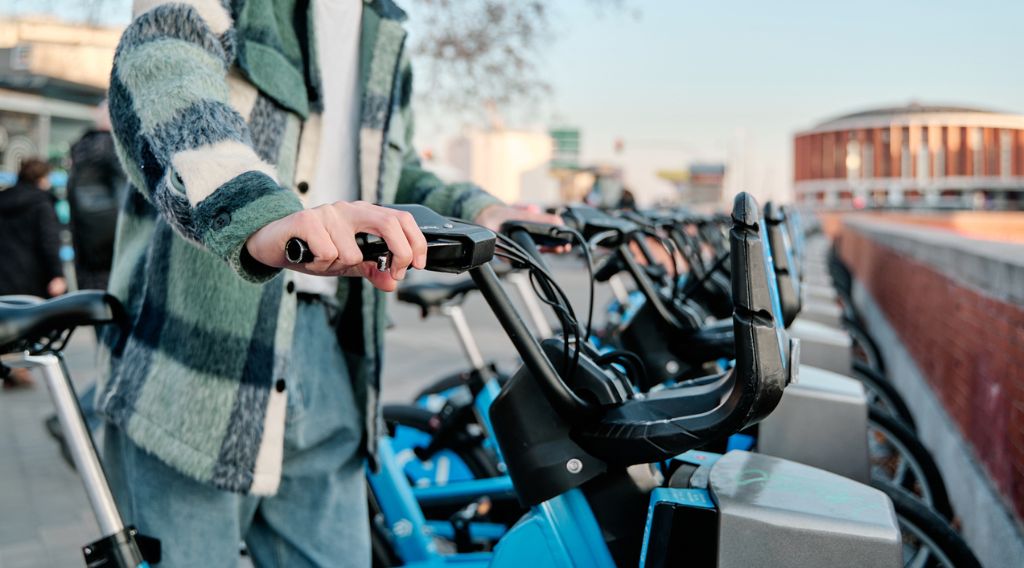
Decarbonizing the transportation sector will require a multi-pronged approach, and GPI is pursuing various strategies, including promoting electrification and low-carbon fuels. However, to achieve our vision of an equitable net-zero carbon economy, we also must also advance shared and active mobility.
Just as energy efficiency is a critical strategy for reducing greenhouse gas emissions in the electricity sector, so is finding ways to reduce vehicle trips a critical strategy for reducing transportation emissions. That’s why we’re expanding our Transportation program’s efforts to advance strategies in shared and active transportation.
This post will dive into how we’re expanding our work in transportation and why we’re grounding that effort in Minnesota, home to GPI’s headquarters.
Expanding efforts in shared and active transportation in our home state
In 2023, the board of directors of Nice Ride Minnesota, a nonprofit organization that was about to end its long-running and first-of-its-kind bikeshare pilot project in the Twin Cities, decided to award its remaining assets to GPI to launch a new area of work focused on advancing shared mobility.
GPI is excited to carry on Nice Ride MN’s legacy and begin focusing more on reducing the need for driving and car ownership by supporting the shift to alternative modes of transportation, including walking, biking, and shared mobility here in Minnesota.
Shared mobility is defined as any transportation services shared by users, either at the same time or individually. Examples include public transit (buses and trains), micro-transit (dial-a-ride and paratransit), micromobility (bike and scooter share), and carsharing. Shared mobility, combined with infrastructure investments that support safe walking and biking, is essential to creating a sustainable and accessible transportation system.
Increasing accessibility and connectivity of transportation options
Car ownership should never be a requirement to access opportunities. However, according to a 2020 Data for Progress Poll, 80 percent of all Americans feel they have “no choice but to drive as much as they do.” This reality is becoming more and more costly for American households.
A 2024 survey of drivers in the United States found that the average American allocates 20 percent of their monthly income to vehicle costs, including auto loans, fuel, insurance, and maintenance. Almost 17 percent of respondents say they got a second job specifically to afford their car. The cost of auto insurance alone has risen 26 percent from 2023 to 2024.
According to the Minnesota Department of Transportation, over 13 percent of Black Minnesotans lack access to a motor vehicle compared to 3 percent of white residents. Further, less than half of Black households in Minnesota have access to two or more vehicles, compared to 80 percent of white households. This disparity is magnified in the Twin Cities due to the renewed popularity of urban living, leading to rising housing costs that force low-income and BIPOC (Black, Indigenous, and people of color) residents to the city’s edges and into the suburbs, where transit and walkability are more limited.
Thoughtfully developed shared mobility services, combined with significant investment in walking and biking infrastructure, can replace shorter car trips and connect to fixed route transit options to provide affordable and accessible mobility options. A truly equitable transportation system allows anyone in any income bracket to easily traverse their community without owning a car.
Lowering emissions through shared and active transportation
The transportation sector is the highest contributor to greenhouse gas emissions nationally and here in Minnesota, with most of those emissions being produced by single-occupancy cars and trucks.
The City of Minneapolis states in its Transportation Action Plan that even with the mass adoption of electric cars, the city will need to reduce automobile passenger miles by 38 percent to reach its goal of reducing greenhouse gas emissions by 80 percent by 2050. This gap shows that not only do we need to continue to make the car trips being taken cleaner, but we also need to make sure people have accessible alternatives to personal vehicles.
The city also notes that past planning decisions that disproportionately impacted Black residents, such as highway creation and redlining, are still resulting in inequitable exposure to pollution and climate risks. This includes exposure to particulate matter and nitrogen dioxide from motor vehicles and the increased heat risk due to a lack of tree coverage.
According to the Minnesota Department of Health, “…the highest estimated rates of air pollution-related death and disease are found in neighborhoods with the largest percentage of Black, Indigenous and People of Color (BIPOC), low-income and uninsured residents, and people who live with a disability.” Active and shared modes can help reduce emissions from vehicles by shifting trips away from personal cars.
Advancing shared and active transportation options plays a key role in advancing GPI’s mission
GPI is exploring strategies that create more choices for people to travel outside of personal vehicles, reducing tailpipe emissions and the need for auto-centric infrastructure investments. This shift will help reduce the amount of greenhouse gases produced by the transportation sector and the exposure to toxins such as particulate matter, carbon monoxide, and nitrogen oxide that can increase the risk of respiratory disease, cardiovascular disease, and adverse birth outcomes that are disproportionately impacting disadvantaged communities.
We’re dedicated to our mission of accelerating the transition to net-zero carbon emissions for the benefit of people, the economy, and the environment. Incorporating shared and active modes into all our transportation work is essential to our progress.
Reach out to Aaron Westling, Shared Mobility Program Manager, at [email protected] to learn more about GPI’s approach to shared and active transportation and how we plan on advancing mobility options in Minnesota and beyond.
